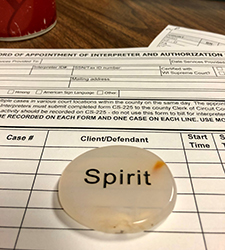
24 Sep Teamwork in the Courtroom and Beyond
Any seasoned interpreter will tell you why we work in teams on long assignments. There is research on the matter of interpreter fatigue and the negative effect it has on accuracy and appropriate rendition. Team interpreting has been done at least since the Nuremberg trials, which began in 1945. Why, then, are some of us still struggling to adhere to the best practice of team interpreting?
 I work and live in Wisconsin, where very few professional interpreters would agree to accept a long assignment without a teammate. In Wisconsin courts, this would be even more rare—if not impossible—to find. Not to brag, but Wisconsin has done a vast amount of work to ensure certified court interpreters understand and comply with the code of ethics, guidelines and standards for court interpreting. This work has given the courts a much better understanding of the intricacies of interpreters’ work, while underscoring the importance of proper training for the judiciary body and for interpreters themselves.
I work and live in Wisconsin, where very few professional interpreters would agree to accept a long assignment without a teammate. In Wisconsin courts, this would be even more rare—if not impossible—to find. Not to brag, but Wisconsin has done a vast amount of work to ensure certified court interpreters understand and comply with the code of ethics, guidelines and standards for court interpreting. This work has given the courts a much better understanding of the intricacies of interpreters’ work, while underscoring the importance of proper training for the judiciary body and for interpreters themselves.
Let’s move over the border just a few miles, into Illinois, where the interpreter certification program is fairly new. The Illinois Court Interpreter Program has taken the initiative to hear interpreters’ concerns and form a language access committee. However, real change can only happen when we all participate in these efforts. Interpreters in Illinois still face the challenge of educating clients on the importance of team interpreting. And while the court interpreter program may prove to be very useful in setting guidelines for court interpreting there, in the end it will be up to interpreters to create a culture of best practice.
When you are offered an interpreting assignment, if your client (the court, an agency, or a law firm) does not understand the need for team interpreting, you can explain that we work in teams to preserve the accuracy of the record. On the NAJIT webpage, in the publications section, you’ll find a position paper on team interpreting. Share it with clients or cite it in your communications. If all attempts to educate your client fail, you will have to decide if this is an assignment you are willing to accept. As language access professionals we understand the relevance of guidelines and professional standards. We cannot force any entity or client to follow these guidelines, but we can choose to adhere to these standards ourselves by turning down assignments that don’t follow the guidelines.
Here’s where teamwork outside the courtroom comes into play. Rely on your colleagues for support and guidance on how to overcome the challenges of the environment you work in. Nobody—unless they’ve been an interpreter—will be able to understand the mental fatigue we experience when our workload is improper. I’ve never done any other job that exhausted my mind more than interpreting, and I’m sure most of you can relate to the experience. Get together and have conversations, because when we work together, we can come up with solutions to the challenges we face. Join professional organizations and seek opportunities to gather with people who share our profession.
Set aside unnecessary competition and team up to support each other’s work. Focus on your colleagues’ strengths. Collaboration is the answer for a successful team interpreting assignment, and for anything else we set out to do as a profession.
Reme Bashi has been a certified court interpreter in Wisconsin since 2008. She began her career as an interpreter and translator in Mexico, at the University of Veracruz, where she majored in pedagogy. Being bilingual in English and Spanish lead her to language teaching and then to translation and interpreting. She was a conference interpreter for several years, interpreting for the media and government events in Mexico.
In the Midwest, Bashi has interpreted in a variety of settings – education, manufacturing, legal, and community. When she’s not interpreting, she likes to learn about new subjects, something that she considers pivotal to becoming a more proficient language access professional. Recently she has immersed herself in hospitality, urban gardening, and ancestry research. Contact: reme_sullivan@yahoo.com


Thank you Reme your points are well made.. Grounded in ethics, bound by professional standards, and committed to best practice. Therefore, it is important that we clearly articulate NAJIT’s position on those points to guide decision-makers and to support our colleagues in the field.. This means constantly reviewing, updating and promoting NAJIT position papers and other supporting documents where necessary.. Great post!
Thanks for commenting! That’s the idea, guide decision makers and support our colleagues all under the umbrella of NAJITs position papers. I really like how you expressed the sentiment of my article.
The NAJIT PPs on Team Interpreting are very helpful to attach to correspondence to support the points I raise in it. Sometimes the person on the other end is already well familiar with the subject but I attach the most recent one regardless, asking them to forward it to their client for consideration.
Reme,
Excellent post! I could not agree more.
I find that some interpreters think of team interpreting only for the simultaneous mode, especially new interpreters. But accuracy is just as important, if not more important, during witness testimony. As you pointed out, we can help our clients understand “that we work in teams to preserve the accuracy of the record.” So having an active AND support interpreter at the stand should be part of that “culture of best practice.”
Thank you.
Thank you for commenting! There are so many reasons why team interpreting makes sense. Let’s continue to do what’s best for proper results.